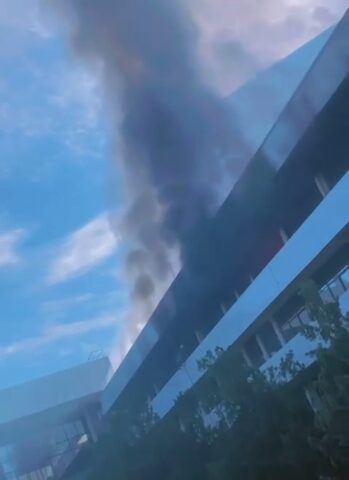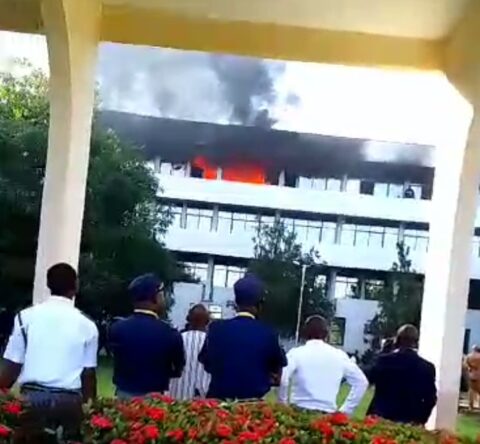By Izunna Okafor, Awka
It is no longer news that earlier this week, a devastating incident unfolded within the heart of Nigeria’s judicial system as flames tore through a section of the Supreme Court. The event sent shockwaves through the nation, compelling citizens to reflect upon the state of preparedness and security within one of the country’s most esteemed institutions.
Spokesperson for the Court, Festus Akande, claimed that the blaze was sparked by electrical issues originating from one of the Chambers of Justice. This was a stark reminder that even the most revered institutions are not immune to the caprices of fate.
Although, there were no reported casualties, but the damage wrought was undeniable. The fire, which first flared up on Monday morning, ignited a frantic struggle by court workers to contain it initially, deploying fire extinguishers in a desperate bid to control the inferno. Regrettably, their valiant efforts were ultimately in vain as the extinguishers quickly ran dry, leaving the fire to rage on, unchecked.
Among the casualties of this incident were the offices of Justice Mohammed Saulawa and two of his colleagues, raising serious concerns about the safety of sensitive legal documents and the continuity of court proceedings in the wake of such calamity.
However, as the world watched in disbelief, the incident raised even more troubling questions about the preparedness of the fire service to respond effectively. Shockingly, videos circulating on social media showed fire service officials struggling and running around in search of water source to combat the blaze, despite a substantial allocation of N15.74 billion in the 2023 budget to the Federal Fire Service.
For many minutes, the firefighters continued their trial and error, scrambling for water and even opening/checking-up some non-functional boreholes in the court premises, while the court officials helplessly watched as the apex court building was got further devoured by flames. This glaring inadequacy not only raises eyebrows but also exposes a fundamental flaw in the Nigeria’s firefighting infrastructure. The lack of water hydrant systems that are common in developed countries, has now become a point of national embarrassment.
Moreso, the fire incident also compels us to question whether the Supreme Court, as the apex court of Nigeria and the headquarters of the judiciary, had adequate contingency plans in place for such unforeseen circumstances beyond the meager of half-gallon cylinders of fire extinguishers. This unfortunate event has laid bare the vulnerabilities within the country’s judicial infrastructure, demanding an urgent and thorough investigation as well as immediate action to prevent a recurrence.
Also intriguingly, the timing of this fire outbreak in the Supreme Court, just days after the submission of appeals by 2023 presidential candidate of the Labour, Peter Obi and that of the People’s Democratic Party, Atiku Abubakar, raises eyebrows and prompts some to ponder whether there might be more to the story than meets the eye. Although court officials vehemently assert that the election petition matters will not be affected by the fire outbreak, the uncanny coincidence is deserving of a deeper inquiry.
As Nigeria confronts the implications of this wake-up call, it is evident that a more robust approach to emergency preparedness, security, and contingency planning is essential to safeguard its critical institutions. The fire that consumed a portion of the Supreme Court has ignited not only flames but also a crucial and timely conversation about the nation’s readiness to handle unforeseen crises. This is a moment that calls for introspection and action, for the Supreme Court is not just a symbol of justice, but a cornerstone of Nigeria’s democracy itself.
It’s a clarion call for a robust approach to emergency preparedness, security, and contingency planning that must resonate across all levels y government in Nigeria. The embers of this fire incident ring a bell that it is high time for government institutions to fortify themselves against unforeseen circumstances, as many damages have resulted from such regrettable incidents, especially as a result of negligence and adequate preparedness by the affected institutions.
In other word, the Supreme Court fire has ignited not only flames but also a crucial concern about the nation’s readiness to handle unforeseen crises.







